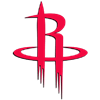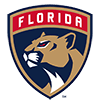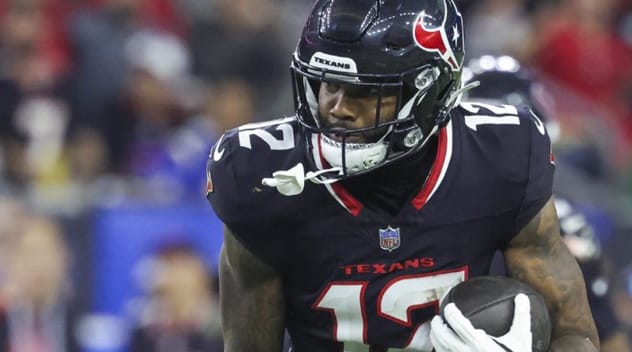NFL Draft talk focuses on rookies and their landing spots, but fantasy managers should also closely watch how those draft choices impact veterans. Let's look at veterans who were winners and losers during the draft.
Winners
Patrick Mahomes, Chiefs
The Chiefs drafted wide receiver Xavier Worthy 28th overall to give Mahomes the downfield threat he hasn't had since Tyreek Hill left. Worthy clocked a Combine-record 4.21 40, which should help Mahomes stretch the field after last year's career lows in average target depth (6.5) and YPA (7.0). Coupled with free-agent acquisition Marquise Brown, Mahomes now has two speedsters with big-play ability who can also create more space underneath for Travis Kelce and Rashee Rice. It also helps cover for the possible suspension of Rice.
Dak Prescott, CeeDee Lamb, Cowboys
With Mike McCarthy taking over playcalling last season, the Cowboys were expected to become more run-oriented. But after their Week 7 bye, McCarthy and company basically gave up on the idea. In the first six games, the Cowboys ranked sixth in the league in rushing rate at 46.4 percent. In the last 11 games, they fell to 25th at 39.2 percent, as Prescott and Lamb led the league in passing yards/TDs and receiving yards/TDs, respectively, in that span. So why are Prescott and Lamb winners in this year's draft? Because the Cowboys did not draft a running back. They brought back the washed-up Ezekiel Elliott on a free-agent deal Monday, making this year's backfield worse than
NFL Draft talk focuses on rookies and their landing spots, but fantasy managers should also closely watch how those draft choices impact veterans. Let's look at veterans who were winners and losers during the draft.
Winners
Patrick Mahomes, Chiefs
The Chiefs drafted wide receiver Xavier Worthy 28th overall to give Mahomes the downfield threat he hasn't had since Tyreek Hill left. Worthy clocked a Combine-record 4.21 40, which should help Mahomes stretch the field after last year's career lows in average target depth (6.5) and YPA (7.0). Coupled with free-agent acquisition Marquise Brown, Mahomes now has two speedsters with big-play ability who can also create more space underneath for Travis Kelce and Rashee Rice. It also helps cover for the possible suspension of Rice.
Dak Prescott, CeeDee Lamb, Cowboys
With Mike McCarthy taking over playcalling last season, the Cowboys were expected to become more run-oriented. But after their Week 7 bye, McCarthy and company basically gave up on the idea. In the first six games, the Cowboys ranked sixth in the league in rushing rate at 46.4 percent. In the last 11 games, they fell to 25th at 39.2 percent, as Prescott and Lamb led the league in passing yards/TDs and receiving yards/TDs, respectively, in that span. So why are Prescott and Lamb winners in this year's draft? Because the Cowboys did not draft a running back. They brought back the washed-up Ezekiel Elliott on a free-agent deal Monday, making this year's backfield worse than the one the Dallas coaching staff didn't trust last year. Expect the Cowboys to continue their pass-heavy ways, helping Prescott and Lamb dominate again.
Murray hit the jackpot with the Cardinals drafting Marvin Harrison fourth overall. The consensus top wide receiver in the draft, the 6-3, 209, Harrison gives Murray the No. 1 WR he didn't have last season. Murray returned from an ACL injury in Week 10 last year, but top wideout Marquise Brown was injured just three weeks later. That made tight end Trey McBride the de facto No. 1 pass catcher, with rookie WR Michael Wilson also dealing with injuries. Brown walked in free agency, leaving McBride and Wilson to see light coverage while defenses devote more attention to Harrison. Now more than a year and a half recovered from his knee injury, Murray could return to being a high-end fantasy option this season.
Najee Harris, Jaylen Warren, Steelers
The Steelers drafted three offensive linemen, with at least two expected to start. In the first round, they took guard Troy Fautanu, followed by arguably the best center in the draft in Zach Frazier in the second round. In the fourth round, they added depth in guard Mason McCormick. That should benefit running backs Najee Harris and Jaylen Warren, who saw their fantasy outlooks improve last season when the team returned to its running game after the Week 6 bye — 23.4 rushes per game in the first five games (30th in the league) vs. 30.8 in the last 12 games (seventh). Coupled with new offensive coordinator Arthur Smith, expect Harris and Warren to get all the work they can handle and be strong fantasy options this season.
Zamir White, Raiders
With coach Antonio Pierce at the helm, the Raiders will base their offense around the rushing attack. That was underscored in the draft when they failed to upgrade their quarterback situation beyond free-agent acquisition Gardner Minshew and holdover Aidan O'Connell. Zamir White, who averaged 21 carries, 91 rushing yards and 2.24 targets in the final four games last season without the injured Josh Jacobs, should be at the center of the run-heavy offense. Jacobs is now in Green Bay and the only backfield additions were Alexander Mattison (free agency) and Dylan Laube (sixth-round draft pick). With volume being king in fantasy football, White should have a productive season.
Travis Etienne, Jaguars
Jacksonville made little attempt to upgrade its backfield in the draft (or in free agency). The Jaguars took a flyer on Keilan Robinson in the fifth round, but he's more of a kick returner than rushing threat. The team will roll with Tank Bigsby and D'Ernest Johnson as Travis Etienne's backups. It seems unlikely either will make an impact. As a result, the Jaguars might be forced to give Etienne more work than he's received the last couple years (14.3 rushes/game since 2022, 15th in the NFL).
Losers
Josh Jacobs, Packers
It looked like Jacobs would have little competition for touches in Green Bay. Aaron Jones is in Minnesota and AJ Dillon's rushing average has declined every year since he was a rookie, dropping to 3.4 yards per rush last season. But then the Packers used a third-round pick on MarShawn Lloyd, projected as one of the top early down grinders in the draft. This is the same coaching staff that held Jones to 12 rushes per game during his age-26 and 27 seasons, even though he was exponentially better than Dillon. If the Packers follow that plan again, the 26-year-old Jacobs could be in for fewer touches than expected. Otherwise, why would they use a day-two pick on a running back?
Chuba Hubbard, Panthers
The Panthers used a second-round pick on Jonathon Brooks, who was the top running back in the draft despite coming off an ACL injury. Brooks is expected to be ready for training camp, but even if it takes him longer to return, he should at some point supplant Hubbard as the lead back. Hubbard finished last year strong when he averaged 86.2 scrimmage yards in the last six games with six touchdowns. But that was built on volume — 22 touches per game — as he averaged just 3.7 yards per rush. Once Brooks is healthy, Hubbard will be relegated to a rotational player.
Javonte Williams, Broncos
Williams could see less work than ever this season after the Broncos drafted Audric Estime in the fifth round. While he was a day-three pick, Estime profiles as an inside power back at 5-11, 221, who could threaten Williams' role. Williams scuffled to 3.6 yards per carry last season coming off an ACL injury. It's possible the injured knee held him back. It's also possible he's simply nothing more than adequate. The door seems open for Estime.
Michael Pittman, Colts
Pittman turned 156 targets into 109 receptions, 1,152 yards and four touchdowns last season. But when Indianapolis added Adonai Mitchell with the 52nd pick of the draft it assured Pittman will have less volume this year. Pittman is a possession receiver with Mitchell the downfield threat, but the targets have to come from somewhere. Slot receiver Josh Downs, who had 98 targets last season, will also get his share. Plus, the Colts never had Jonathan Taylor and Anthony Richardson on the field at the same time last year. With both healthy, the rushing attack will cost Pittman volume too.
Kyren Williams, Rams
As a rookie in 2022 with limited action, Williams didn't appear to be anything special as a running back. Last year, the running back was a league winner. If Williams is truly special, it's possible that selecting Blake Corum in the third round of the draft is merely backfield insurance. But if Corum plays anywhere near expectations, he could at least get change-of-pace carries and also could be used in the passing game. It's also possible Corum proves better than Williams. There are plenty of scenarios where it significantly impacts the incumbent's workload.
Bucky Irving, the Bucs' fourth-round pick, has a similar skillset as White, which probably means the incumbent won't approach the massing volume he had last season — 272 rushing attempts and 70 targets. Not only do few running backs get that level of volume, but White was more the default choice with only Chase Edmonds and Sean Tucker as backfield competition. In two seasons, White's career rushing average is just 3.7 yards and last year his broken-tackle rate and yards after contact were below the 34th percentile. Those drafting White and hoping for similar volume to last year likely will be disappointed.


































